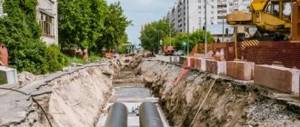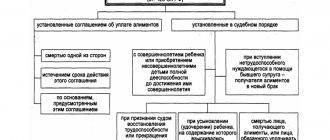Home / Housing / Housing and communal services
Back
Published: 06/02/2021
Reading time: 9 min
1
883
The constant increase in the cost of utility services leads to the fact that citizens stop paying for them. Housing services, in turn, try to collect debts by all available means. They have the right to reduce the supply of economic services for a certain period of time, and then stop it completely. Therefore, to the question whether hot water can be turned off for non-payment, the answer will be in the affirmative. However, the procedure must be carried out within the framework of the law, without unauthorized actions of the management organization, which sometimes, unfortunately, happens.
FREE CONSULTATION WITH A LAWYER
Tel.
+7 (800) 302-65-54 Free in Russia
What to do if the water is turned off.
- 1 Legislative acts on shutting off hot water in 2020
- 2 Requirements for turning off water supply 2.1 Turning off an individual apartment
- 6.1 Complaint regarding illegal disconnection
Legal requirements for the procedure
The provision of housing and communal services to citizens is regulated by the Rules approved by Decree of the Government of the Russian Federation No. 354 of 05/06/2011. According to this document, the supplier may suspend or limit the provision of services after sending a preliminary notification to the debtor.
The consumer must be familiar with the warning 30 days before the expected sanctions.
The grounds for suspension of the service are considered to be:
- Non-payment within three months.
- Incomplete payment for the same period after receiving notification from the supplier.
- Violation of the debt repayment agreement concluded between the debtor and the supplier.
The same document states that, according to sanitary standards, it is prohibited to suspend the supply:
- cold water;
- heating;
- gas intended for heating;
- sewerage.
Without them, the premises automatically become unfit for habitation, therefore, the Housing Code of the Russian Federation is violated. A direct ban on turning off cold water and heating is contained in paragraph 307 of the Decree of the Government of the Russian Federation.
Utilities have the right to turn off:
- hot water;
- electricity;
- intercom;
- gas intended for cooking.
Signs of legality of the shutdown procedure
Often, when there is a water outage in a house, you can hear that such actions by suppliers are unlawful. In fact, determining legitimacy is quite easy. Turning off water for non-payment in an apartment building is legal only if a number of conditions are met:
- non-payment of money for water supply services must be for at least three months;
- residents are required to be notified of threatened sanctions;
- turning off water will not violate the rights of persons living in this territory, but regularly paying for services.
There is an opinion that a court decision is necessary to restrict a service. In fact, it is wrong. The supplier has the legal right not to apply to any judicial authorities to carry out shutdown measures.
All other situations, except for emergencies, in which citizens are restricted from accessing public utilities, are considered illegal.
Summarizing the information, we can give a positive answer to the question whether hot water can be turned off for non-payment. Yes, this is possible subject to a number of mandatory conditions.
What happens if you don't pay for utilities ? Watch this video:
Attention! Due to recent changes in legislation, the legal information in this article may be out of date!
Our lawyer can advise you free of charge - write your question in the form below:
- if residents, without receiving a permit, connected to the general water supply system on their own;
- in cases where communications inside the premises occupied by the client are in disrepair and require prompt repair or replacement;
- when, due to improper operation of the equipment, due to the negligence of persons living in the premises, an accident occurred;
- if the persons living in the apartment, without the permission of the authorized bodies, rebuilt the engineering communications inside the premises (for example, they installed a heated floor in the bathroom);
- when the owner did not apply for permission from the regulatory authorities, but moved the heating radiator without approval.
- The company providing the service is obliged to send the debtor a written notice of its intention to suspend water supply due to existing non-payments. The document displays the total amount of debt and the period for which it was formed, as well as a schedule for the upcoming shutdown. The warning can be sent by registered mail, or it can be delivered personally to the homeowner against signature.
- If the debt is not repaid within 20 days, the company blocks access to hot water supply. The period begins to count from the moment the notice is delivered. If it was not delivered personally, then the date on the postmark is considered to be it.
- Employees of the supplier company seal the plumbing equipment inside the apartment, which is used to supply hot water.
If there is a leak inside the apartment, then a shut-off valve can be used for this purpose. And then water will not flow into this particular room. If damage is detected on the pipes that lead water to the apartment, then it becomes necessary to turn off the water supply at the common valve in the house.
It is installed at the water meter. In such a situation, all apartments located on a particular riser find themselves without water. In a private house, the procedure is the same as in an apartment building. If residents pay off their debt, they must submit a written application to the management company with a request to restore the disconnected service. It takes 3 business days to restore water supply.
To avoid future ambiguities, it is better to draw up the application in two copies. It would be better if one of them bears the signature of an authorized person received upon filing. This is done in case the supplier does not meet the deadline for restoring the water supply and will have to file a complaint against him in court. The main legal issues related to the rules for the provision and refusal to supply utility services are regulated by RF PP No. 354 dated May 6, 2011. According to this act, the supplier has the rights that allow him to turn off hot water to consumers.
But only if there are violations of the contract between him and the client and subject to a number of procedural rules. The law prohibits depriving people of cold water. It is especially important to understand how water is turned off for non-payment in one apartment. The country has Rules for the provision of public services, which were adopted more than 5 years ago, and all companies involved in this area are required to follow.
This document, in particular, regulates the procedure for turning off water in residential and non-residential premises due to non-payment of outstanding payments for utility services.
Procedure for turning off water for non-payment
Restriction of water supply to the defaulter is carried out in the following order:
- The debtor is sent a notice of the expected suspension of water supply if the debt is not paid within 30 days. The warning is delivered by registered mail or handed to the addressee against a signature (read more about the rules for drawing up various documents about turning off water here).
A properly drafted warning should contain the following points::- full name of the debtor;
residential address;
- account number;
- debt period;
- amount of debt;
- debt repayment date.
- If the debt is not repaid within the allotted time, the service provider will limit it, if such a technical possibility exists. The management company is obliged to additionally warn the consumer 3 days before the proposed actions.
- The utility supply restriction is in effect for 30 days . If the debtor does not take action to pay the debt within the allotted time, the utility service is turned off.
- Suspension of water supply does not mean that the debtor may not pay the resulting debt. The supplier has the right to recover funds through the court.
Warning about turning off water for non-payment, sample
Procedure for turning off water
The owner of the living space receives a notification that the supply of housing and communal services will soon be suspended if the debt is not paid within 30 days
It includes:
- Full name of the defaulter;
- residential address;
- l/s number;
- the amount, term and date of repayment of the debt.
Information
If an individual cannot liquidate the debt within a certain period of time, the management company will limit the water supply. The organization must additionally notify the owner of the premises 3 days before carrying out the manipulations.
The restriction lasts 30 days. If an individual does not repay the debt within this period, the supply of housing and communal services will be stopped. But this does not mean that the debtor has the right not to pay the debt. The management company has the right to recover money by filing a lawsuit in court.
How is it done?
Restriction or suspension of the supply of utility services is possible only if these actions do not cause inconvenience to other owners of the premises and do not create a threat of harm to the common property of the apartment building.
Turning off hot water for non-payment in a separate apartment is carried out by shutting off or welding the pipes . Often, defaulting owners try to prevent utility workers from allowing them into the apartment. But such a position can lead to additional expenses.
Non-payers can install a plug on the water supply pipe from the basement of the apartment building using a special device. This manipulation is carried out for a certain cost, which managers also collect from the debtor.
As a result, the owner will have to pay the arrears in utility payments, late fees, and the cost of installing and subsequently removing the plug from the pipe.
IMPORTANT . Non-payment within 3 months must be in full. If during the specified period the owner of the premises paid at least one ruble for water supply, disconnection for debts will be considered illegal.
It is prohibited to disconnect the heating system when this measure is disproportionate to the owner’s violation
At the same time, the legislation of the Russian Federation allows you to turn off the utilities if utilities have not been paid for two times in a row. However, the courts do not always react positively to such a radical measure - turning off electricity, for example, on the basis of a small debt.
And such an action is not entirely beneficial for the utility companies themselves if the debt is not large. To avoid disconnection, it is recommended to at least partially repay the current debt so that it does not transform into a large amount.
Actions of the debtor in case of illegal disconnection
If a citizen believes that the water supply was turned off by suppliers illegally, he must act as follows:
- Send a written application to the management company with a request to restore the water supply and recalculate for the period of shutdown.
- If water does not appear in the apartment within three days, a claim is filed to be sent to Rospotrebnadzor and the Prosecutor's Office. A copy of the statement sent to the management company is attached to the claim.
The owner of the premises may also file a claim in court.
The claim is accompanied by photos and videos confirming the lack of utilities in the apartment, as well as witness statements.
Effective evidence is an inspection report drawn up in the presence of two witnesses.
You can find out more about where to complain about illegal shutdown of hot water and heating here.
The procedure for turning off hot and cold water or depriving water supply for rent arrears
- We must indicate all the authorities to which the complaint will be sent in a special field for addressees;
- the introduction must indicate the full address of the house with the number of apartments and the period of absence of hot water;
- We enclose evidence that the water supply has been stopped, and also describe the measures taken by the victims to restore the service;
- we refer to material damage that has been caused or is currently being caused, as well as a possible threat to the health and normal life of people living in apartments with suspended water supply;
- We request that the water supply be established as soon as possible and that the perpetrators be brought to justice.
If you systematically ignore payment receipts, be prepared to be considered a defaulter. You become such if a three-month debt accrues to established organizations. That is, if payment for utilities is not received for 90 days, then you are already a defaulter.
The epithet “malicious” can easily be added to this unpleasant word if debts to supply companies are not repaid within six months. In many Russian families, financial problems often arise, and therefore payments for housing and communal services may be suspended for an indefinite period of time, but a pressing question immediately arises - can the water be turned off for non-payment of utilities? Every person needs to know that such a scenario is not at all excluded, however, there are common cases when utility services shut off sewerage for non-payment, without following the law.
So, when the actions of public utilities violate your rights, as well as what authorities you can contact in this case, we will consider in this article. Disconnecting an apartment from the water supply and blocking the sewerage system certainly causes a lot of inconvenience and interferes with normal life, especially if there is a small child in the family, so every tenant wants to get rid of these inconveniences as soon as possible. But he often resorts to measures that are not entirely legal, that is, he tries to dismantle the locking systems himself using improvised means.
The main legal issues related to the rules for the provision and refusal to supply utility services are regulated by RF PP No. 354 dated May 6, 2011. According to this act, the supplier has the rights that allow him to turn off hot water to consumers. But only if there are violations of the contract between him and the client and subject to a number of procedural rules. The law prohibits depriving people of cold water. If there is a leak inside the apartment, then a shut-off valve can be used for this purpose.
And then water will not flow into this particular room. If damage is detected on the pipes that lead water to the apartment, then it becomes necessary to turn off the water supply at the common valve in the house. It is installed at the water meter.
In such a situation, all apartments located on a particular riser find themselves without water.
- if residents, without receiving a permit, connected to the general water supply system on their own;
- in cases where communications inside the premises occupied by the client are in disrepair and require prompt repair or replacement;
- when, due to improper operation of the equipment, due to the negligence of persons living in the premises, an accident occurred;
- if the persons living in the apartment, without the permission of the authorized bodies, rebuilt the engineering communications inside the premises (for example, they installed a heated floor in the bathroom);
- when the owner did not apply for permission from the regulatory authorities, but moved the heating radiator without approval.
It is especially important to understand how water is turned off for non-payment in one apartment. The country has Rules for the provision of public services, which were adopted more than 5 years ago, and all companies involved in this area are required to follow. This document, in particular, regulates the procedure for turning off water in residential and non-residential premises due to non-payment of outstanding payments for utility services.
- the management company or the water utility directly must notify the debtor in writing of their intentions 30 days before turning off the water in his apartment for non-payment;
- the person receiving such notice signs for receipt of it;
- within a month from the date of receipt of the warning, the citizen must pay the debt;
- If payment is not made within the specified time frame, then another notification is sent. After this, the defaulter has three days to deposit the required amount on receipts.
- We must indicate all the authorities to which the complaint will be sent in a special field for addressees;
- the introduction must indicate the full address of the house with the number of apartments and the period of absence of hot water;
- We enclose evidence that the water supply has been stopped, and also describe the measures taken by the victims to restore the service;
- we refer to material damage that has been caused or is currently being caused, as well as a possible threat to the health and normal life of people living in apartments with suspended water supply;
- We request that the water supply be established as soon as possible and that the perpetrators be brought to justice.
If you systematically ignore payment receipts, be prepared to be considered a defaulter. You become such if a three-month debt accrues to established organizations. That is, if payment for utilities is not received for 90 days, then you are already a defaulter.
The epithet “malicious” can easily be added to this unpleasant word if debts to supply companies are not repaid within six months.
- if non-payment of utilities is caused by delay in payment of wages. Then you need to contact your management company with a document from the place of work, which confirms this delay, indicating from what time payment has not been made;
- if all family members collectively have income that
Read on the Russia-Ukraine website:
Is the Canteen classified as Administrative and Management Personnel?
- Reflection of Subsidies for Repayment of Accounts Payable
- Agent's Report on Work Completed Sample
- Preparation of Documents according to GOST with Example
- Money was erroneously transferred from the Special Account for the State Defense Order
Attention!
Due to recent changes in legislation, the legal information in this article may be out of date! Our lawyer can advise you free of charge - write your question in the form below.
How to make a claim and complaint?
There are no unified forms for drawing up claims and complaints, so they are drawn up according to the general rules for drawing up business papers:
- The management company's claim is drawn up in the name of its director. The document contains the following points:
- name of company;
personal data of the applicant (full name, address, contacts);
- the essence of the claim with references to the norms of law. In this paragraph, it is necessary to indicate the illegality of disconnection due to lack of notification or partial payment;
- the requirement to restore the supply of utility services within a specific time frame and recalculate payments for the period of shutdown;
- date and signature.
- A complaint to the Housing Inspectorate or the Prosecutor's Office is filed after receiving a negative response from the Criminal Code or when the consumer's requirements are completely ignored. It is drawn up in the name of the head of the organization and includes items:
- name of company;
personal data of the applicant;
- description of the circumstances of the case indicating the fact of illegal water shutoff. This paragraph describes filing a claim with the Criminal Code and reports the content of the organization’s response;
- please evaluate the actions of the management company’s employees;
- date and signature.
- A statement of claim is filed in court after receiving a response from the regulatory authorities. provided that the problem has not been solved or if it is possible to prove the moral damage caused by the shutdown. Such cases are within the jurisdiction of district courts, so you need to contact this organization.
The document is drawn up according to general rules and includes points:- name of the judicial authority;
plaintiff's details: full name, residential address, telephone number;
- details of the defendant: full name of the management company, full name of the director, legal address, telephone number;
- statement of claims. This paragraph describes the circumstances of turning off the water supply, the date of filing a claim with the Criminal Code and the content of the response. You can also describe the circumstances of contacting regulatory authorities. Your own claims must be supported by references to the violated norms of the law;
- We request that it be illegal to turn off the water supply based on current legislation.
The claim must be accompanied by a receipt for payment of the invoice (if available).
Sample complaint from the management company about turning off hot water.
Attached to the complaint is a copy of the complaint sent to the Criminal Code and the response received from it.
Attached to the statement of claim are copies of the claim to the Criminal Code and the complaint to the regulatory authorities, as well as the responses received from these organizations.
IMPORTANT . The outcome of the case when going to court directly depends on the correctness of the statement of claim. Therefore, it is more advisable to seek help in its preparation from a qualified lawyer.
Do they have the right to turn off cold water in a private house for non-payment?
If the consumer partially pays for the utilities and maintenance services provided by the contractor, the contractor divides the payment received from the consumer between all types of utilities indicated in the payment document and the fee for the maintenance and repair of the residential premises in proportion to the size of each fee specified in the payment document . In this case, the contractor calculates the consumer's debt for each type of utility service based on the partially unpaid amount. e) the contractor receives an order from the body authorized to exercise state control and supervision over the compliance of in-house engineering systems and in-apartment equipment with established requirements, on the need to introduce a restriction or suspension of the provision of utility services, including an order from the executive body of the constituent entity of the Russian Federation authorized to exercise state control for compliance of the quality, volume and procedure for the provision of utility services with established requirements, about the unsatisfactory condition of in-house engineering systems (for the technical condition of which the owner of a residential building is responsible) or in-house equipment that threatens an accident or poses a threat to the life and safety of citizens - from the day specified in the document the relevant authority. 118.
Underpayment by a consumer of a utility service is understood to mean that the consumer has a debt to pay for 1 utility service in an amount exceeding the sum of 2 monthly fees for a utility service, calculated on the basis of the utility service consumption standard, regardless of the presence or absence of an individual or common (apartment) meter and tariff for the corresponding type of utility resource, valid on the day of restriction of the provision of utility services, provided that the debtor consumer does not have a debt repayment agreement concluded with the contractor and (or) if the debtor consumer fails to comply with the terms of such an agreement. 116. In the cases specified in subparagraphs “a” and “b” of paragraph 115 of these Rules, the contractor is obliged, in accordance with paragraph 104 of these Rules, to register in the logbook the date, start (end) time and reasons for the restriction or suspension of the provision of utility services, and also, within 24 hours from the date of restriction or suspension of the provision of utility services, inform consumers about the reasons and expected duration of the restriction or suspension of the provision of utility services.
Responsibility of the management company for illegal disconnection
The law provides for liability of suppliers for illegally turning off water:
- Administrative liability - a fine of 500 to 1,000 rubles for officials and from 5,000 to 10,000 rubles for legal entities.
This measure is applied by regulatory authorities if violations are established (Article 19.1 of the Code of Administrative Offenses). - Criminal liability is established by the court in the event of material or moral harm being caused to the owner.
The act carries a fine of up to 200,000 rubles and imprisonment of up to 3 years.If a person’s death occurs as a result of illegal actions, imprisonment is possible for up to 5 years. In addition, a ban is imposed on the right to hold leadership positions for three years.
- Arbitrariness is punishable by a fine of 80 thousand rubles (or in the amount of six months' salary) or forced labor for up to 200 hours.
If there are threats against the debtor, arrest for up to six months is applied. In exceptional cases, the court increases the term to 5 years (Article 330.215 of the Criminal Code).
If the disconnection is declared illegal due to lack of notification, the debtor receives a paper and is given a 30-day period to repay the debt. You will have to pay the bills anyway.
The illegally turned off water supply must be restored within three days, and payments must be recalculated.
Methods for filing a claim with the Criminal Code and response deadlines
A claim to the management company for illegal shutdown of water supply can be submitted to the responsible employee or sent to the organization by registered mail with notification. When submitted in person, the claim is drawn up in two copies . The receiving employee must sign and date the copy remaining with the applicant.
A response from the management company must be received within 10 days from the date of receipt of the claim. A response to a complaint to Rospotrebnadzor, the Housing Inspectorate or the prosecutor's office must follow within 30 days. If organizations violate the deadlines for taking measures, the consumer should file a claim in court.
The consumer is obliged to pay for the services provided to him in a timely manner and in the proper amount, so that the management company does not have grounds for turning off their water. If managers exceed their authority and turn off the water illegally, it is worth calling them to account and restoring their own consumer rights.










